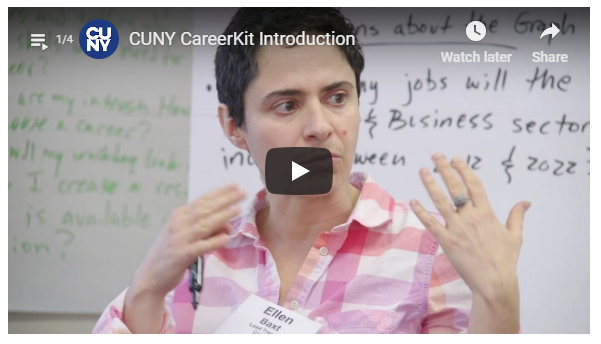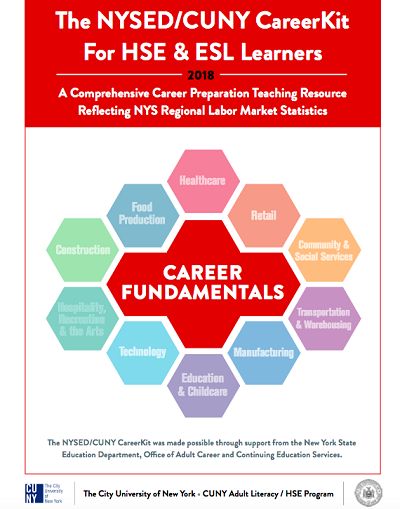- MN ABE Connect
- Archive
- Strike Lesson Planning Gold with the CareerKit Project
 March 25, 2019
March 25, 2019
Strike Lesson Planning Gold with the CareerKit Project
Stephanie Sommers, ACES CoordinatorWhen I am looking for new resources to add to the ACES Resource Library, one of my favorite places to look is on the LINCS website. The various discussion boards that make up the LINCS Community always contain a wealth of ideas and topics, but I recently struck gold when I came upon a newer resource from the City University of New York (CUNY) called the CareerKit Project.
 This project, which was co-funded by the New York State Education Department, consists of lessons and materials that introduce learners to careers in ten sectors. The sectors are:
This project, which was co-funded by the New York State Education Department, consists of lessons and materials that introduce learners to careers in ten sectors. The sectors are:
- Healthcare
- Technology
- Community and Social Services
- Education and Childcare
- Manufacturing
- Hospitality, Recreation, and the Arts
- Food Production
- Retail
- Construction
- Transportation and Warehousing
The kits were developed to introduce learners to careers in each sector, while also building core reading, writing, research and math skills. According to the CareerKit Project website, “Each CareerKit activity fulfills a dual purpose – the acquisition of career information and the development of language, literacy and numeracy skills that support achievement on standardized tests.”
The lessons were written to be used with learners at a more advanced level who are preparing to earn a high school equivalency (HSE) diploma. However, they can be adapted for use with intermediate level ELL and pre-GED students, and suggestions are given in the user’s guide for how to do so.
Additionally, the project contains one other kit that was written to introduce learners to key questions regarding career decision-making. This foundational kit is called Career Fundamentals, and it does not focus on a particular career sector. Career Fundamentals contains six units with names like “Today’s Labor Market,” “Choosing a Career, Finding a Job,” and “Parenting is a Job, Too.” Teachers hoping to integrate some ACES skills into their lessons could easily use these units to focus on Developing a Future Pathway.
Because of its dual purpose, the CareerKit Project has been added as a resource to both the Developing a Future Pathway and the Learning Strategies sections of the ACES Resource Library.
How to use this resource
The CareerKit Project is a library of hundreds of high-quality lessons that instructors can pick and choose from to suit the needs of their learners and program. In other words, the idea is not to work through every lesson. The project includes a table of skills that allows users to find career-related activities that reinforce the basic skills (reading, writing and math) that they are already working on. The lessons are also very explicit about what basic skills are being taught, so it is clear to both instructors and learners. This helps to address an issue that some people have with teaching career-related content, which is how to make it appealing to students who don’t all have the same career goals, or any career goals at all.
It also really reinforces the idea that using contextualized career-focused basic skills lessons is a time-saver. Students learn the basic skills and learning strategies that they need to be successful at school and on standardized tests, while also becoming familiar with career content that will help them to choose and enter a future pathway.
Also included in the project is an excellent user’s guide that walks through how to get the most out of using the lessons. It even includes tips on how to teach some of the strategies that are shown to help learners find success, including how to teach annotation and how to teach paraphrasing. Another very useful feature is the summary that begins each unit, which lays out what students have learned so far if they have completed the previous unit(s) and what is coming up.
Caveats for Minnesota practitioners
For ABE practitioners living in Minnesota, there are a few things to be aware of when using these materials. First, New York is not a GED state. That means students in New York prepare for a different high school equivalency exam called the TASC. When using these lessons, you will notice many references to skills that will help students prepare for the TASC. These include things like paraphrasing, graph interpretation, and determine central idea. Teachers familiar with the GED will recognize these core skills as the same ones that learners need to develop for success on the GED test. This is because both the GED and the TASC were developed to align with the Common Core State Standards.
Second, these materials were developed to be of use to learners living in New York State. The project was designed to reflect New York State regional labor market statistics. Furthermore, some of the information and suggested resources contained in the kits are specific to New York. An activity in the Knowing Myself unit from the Career Fundamentals kit involves doing career research, for example, and the first website listed is one that is specific to finding career information for New York. However, the lesson does suggest several other websites, such as My Next Move.
Overall, I think that the benefits for both teachers and learners to using the kits far outweigh any drawbacks that might arise from them being state specific. Additionally, there are instructions on the website for how to request the PDF materials in Word format so that instructors can use their “adaptive expertise” to make them more relevant and relatable. If you are teaching adults, you should be able to find something in this collection worth teaching.
Upcoming ACES-related training opportunities
For more ACES-related resources and training, please join us at the upcoming ABE Spring Regional events. There will be a session about using ACES to develop navigation practices with ABE teachers in Walker on March 29 and in Mankato on April 12.
The ACES spring webinar is scheduled for April 23 from 2:00-3:30. We will be discussing how to integrate ACES skills into lessons for low-level ELL learners, and we’ll be joined by several teachers who have experience with successfully doing this.
Newsletter Signup
Get MN ABE Connect—the official source for ABE events, activities, and resources!
Sign UpArticle Categories
- ABE Foundations/Staff Onboarding
- ACES/Transitions
- Adult Career Pathways
- Assessment
- CCR Standards
- Citizenship
- COVID-19
- Cultural Competency
- Digital Literacy/Northstar
- Disabilities
- Distance Learning/Education
- ELA
- Equity/Inclusion
- ESL
- HSE/Adult Diploma
- Listening
- Math/Numeracy
- Mental Health
- Minnesota ABE
- One-Room Schoolhouse/Multilevel
- Professional Development
- Program Management
- Reading
- Remote Instruction
- Science
- Social Studies
- Speaking/Conversation
- Support Services
- Teaching Strategies
- Technology
- Uncategorized
- Volunteers/Tutors
- Writing